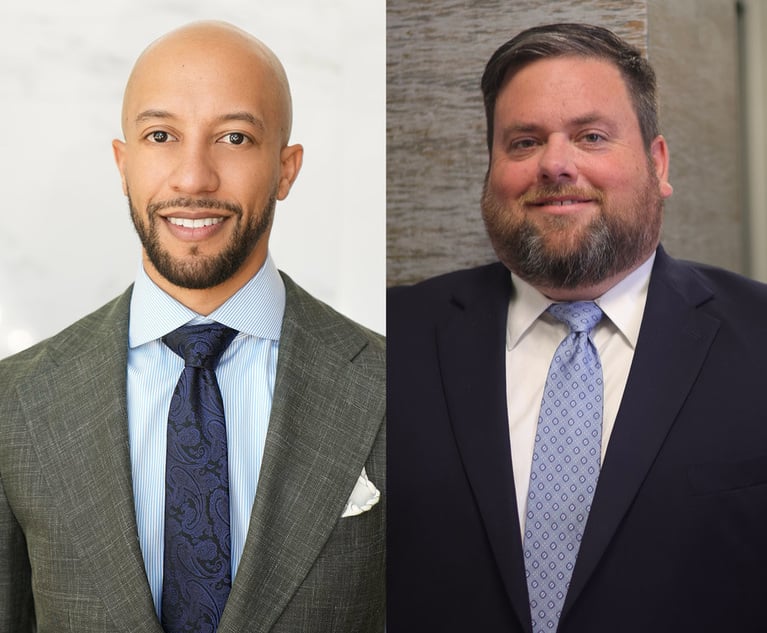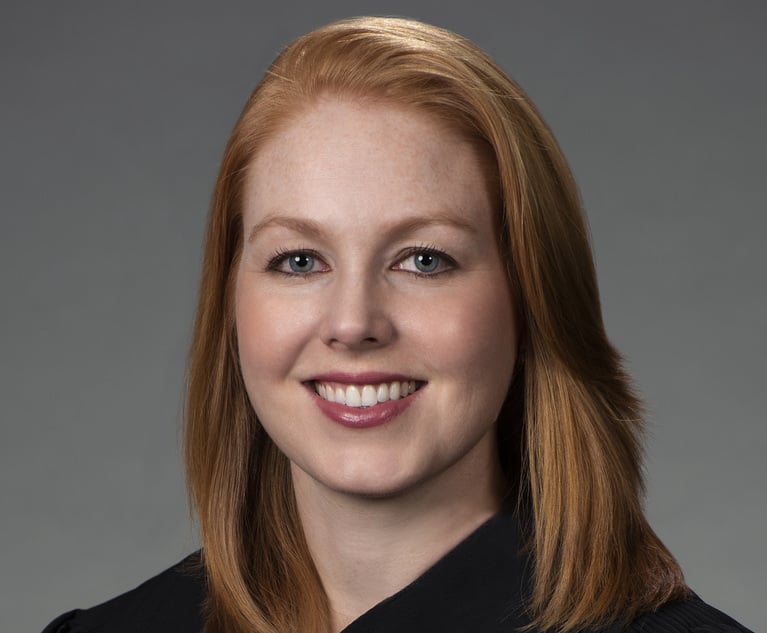Paper Ballot Plaintiff Lawyers Seek $5.6M in Legal Fees From State
After two years of litigation and an injunction by U.S. District Judge Amy Totenberg barring the state from using current voting machines past Jan. 1, legal teams for two sets of voter plaintiffs and a nonprofit election transparency group want the state to reimburse them for their legal fees and expenses.
September 03, 2019 at 06:27 PM
5 minute read
 Bruce Brown (left) and David Cross. (Photos: John Disney and Diego M. Radzinschi/ALM)
Bruce Brown (left) and David Cross. (Photos: John Disney and Diego M. Radzinschi/ALM)
Attorneys representing Georgia voters and an election transparency organization battling state election officials for a return to paper ballots have asked a federal judge to award them an estimated $5.6 million in legal fees and expenses.
 Judge Amy Totenberg, of the U.S. District Court for the Northern District of Georgia
Judge Amy Totenberg, of the U.S. District Court for the Northern District of GeorgiaThe fee requests cited orders by Judge Amy Totenberg of the U.S. District Court for the Northern District of Georgia—one last month and one last year—as proof the fees are warranted and that the litigation has already resulted in "fail-safe alternatives" to protect the security and validity of Georgia elections, beginning Jan. 1. The motions also cited Totenberg's refusal to dismiss the case last May.
The fees stem from a 2017 suit against the secretary of state and the state elections board claiming that Georgia voters have a constitutional right "to cast a vote that is properly counted." The state's use of paperless electronic voting machines and its reliance on a computerized voting system powered by obsolete software with a demonstrated vulnerability to hackers violates that right, the suit contends.
A team of lawyers representing the nonprofit Coalition for Good Governance and several plaintiff voters is seeking approximately $1.6 million in fees and expenses. The lawyers include Atlanta attorney Bruce Brown, Cary Ichter of Atlanta's Ichter Davis, Seattle attorney Robert McGuire and John Powers and Ezra Rosenberg of the Washington, D.C.-based Lawyers' Committee for Civil Rights Under Law.
Attorneys for a second group of voter plaintiffs have asked for nearly $4 million in fees and expenses. They include a team from the Washington, D.C., offices of Morrison & Foerster led by partner David Cross and two attorneys with Atlanta's Krevolin & Horst.
The motions also warn that the plaintiffs' lawyers may seek additional fees and expenses associated with enforcing last month's injunction by Totenberg or litigating the fees.
Tess Hammock, a spokeswoman for Secretary of State Brad Raffensperger, said he "will work to protect taxpayers from these demands" and "will continue to move forward" with implementing a new system the state has purchased.
Coalition lawyers said in their motion that Totenberg's injunction "already constitutes success on the merits," thus entitling them to reasonable legal fees and expenses.
"Over the course of this litigation, the plaintiffs amassed mountains of evidence and expert testimony proving the defective operation of the DRE [direct-recording electronic] voting system and the inadequacy and security risks it posed," they contend.
Totenberg's Aug. 14 order barred Georgia from using its paperless voting equipment after Jan. 1. The judge also ordered Raffensperger to develop a plan for the use of paper ballots during the March 2020 primary and beyond if the state fails to fully implement a new system that it just contracted to purchase in July.
Totenberg gave the state a Jan. 3 deadline to develop the default plan. She also ordered the secretary of state to select a number of jurisdictions to conduct elections with hand-marked paper ballots, optical scanners and "voter-verifiable, auditable ballot records" during the November 2019 election.
Last September, Totenberg declined to order the state to use paper ballots during the 2018 election, although she held that the plaintiff voters and the coalition were "substantially likely to succeed on the merits of their claims." But the judge said in her order that she feared an immediate rollout of paper ballots statewide likely would adversely impact an orderly, fair election.
She warned the state at the time that any new balloting system must address the need for "transparent, fair, accurate, and verifiable processes" guaranteeing the fundamental right "to cast an accountable vote."
She also warned the state that any further delays in junking the current system "would be intolerable."
In her August order, Totenberg said the secretary of state and state election officials "have been slow and poorly equipped" in tackling the challenges and deficiencies of the state's current system. The judge also criticized state election officials and their lawyers for "inconsistent candor with the court" over the security of the state's voting system servers and the discovery that confidential information from the state voter registration database was publicly accessible for at least six months while it was housed at Kennesaw State University's Center for Election Systems, which then had a contract with the secretary of state.
Totenberg also said that evidence introduced during the litigation "demonstrates the perilous vulnerability and unreliability of the state's electronic voter registration system as well as its burdening of Georgia citizens' right to cast a vote that reliably will be counted."
This content has been archived. It is available through our partners, LexisNexis® and Bloomberg Law.
To view this content, please continue to their sites.
Not a Lexis Subscriber?
Subscribe Now
Not a Bloomberg Law Subscriber?
Subscribe Now
NOT FOR REPRINT
© 2025 ALM Global, LLC, All Rights Reserved. Request academic re-use from www.copyright.com. All other uses, submit a request to [email protected]. For more information visit Asset & Logo Licensing.
You Might Like
View All
'Pushed Into Oncoming Traffic': $5.85M Settlement in Mediated Auto Tort
6 minute read
Justice Known for Asking 'Tough Questions' Resolves to Improve Civility
4 minute read
Trending Stories
- 1The Legal Status of Presidential Diaries Must Be Clarified
- 2Litigators of the Week: Shortly After Name Partner Kathleen Sullivan’s Retirement, Quinn Emanuel Scores Appellate Win for Vimeo
- 3Litigator of the Week Runners-Up and Shout-Outs
- 4Weil Hires White & Case Partner in Rebuild of London Finance Ranks
- 5Morgan Lewis Closes Shenzhen Office After Less Than Two Years
Who Got The Work
J. Brugh Lower of Gibbons has entered an appearance for industrial equipment supplier Devco Corporation in a pending trademark infringement lawsuit. The suit, accusing the defendant of selling knock-off Graco products, was filed Dec. 18 in New Jersey District Court by Rivkin Radler on behalf of Graco Inc. and Graco Minnesota. The case, assigned to U.S. District Judge Zahid N. Quraishi, is 3:24-cv-11294, Graco Inc. et al v. Devco Corporation.
Who Got The Work
Rebecca Maller-Stein and Kent A. Yalowitz of Arnold & Porter Kaye Scholer have entered their appearances for Hanaco Venture Capital and its executives, Lior Prosor and David Frankel, in a pending securities lawsuit. The action, filed on Dec. 24 in New York Southern District Court by Zell, Aron & Co. on behalf of Goldeneye Advisors, accuses the defendants of negligently and fraudulently managing the plaintiff's $1 million investment. The case, assigned to U.S. District Judge Vernon S. Broderick, is 1:24-cv-09918, Goldeneye Advisors, LLC v. Hanaco Venture Capital, Ltd. et al.
Who Got The Work
Attorneys from A&O Shearman has stepped in as defense counsel for Toronto-Dominion Bank and other defendants in a pending securities class action. The suit, filed Dec. 11 in New York Southern District Court by Bleichmar Fonti & Auld, accuses the defendants of concealing the bank's 'pervasive' deficiencies in regards to its compliance with the Bank Secrecy Act and the quality of its anti-money laundering controls. The case, assigned to U.S. District Judge Arun Subramanian, is 1:24-cv-09445, Gonzalez v. The Toronto-Dominion Bank et al.
Who Got The Work
Crown Castle International, a Pennsylvania company providing shared communications infrastructure, has turned to Luke D. Wolf of Gordon Rees Scully Mansukhani to fend off a pending breach-of-contract lawsuit. The court action, filed Nov. 25 in Michigan Eastern District Court by Hooper Hathaway PC on behalf of The Town Residences LLC, accuses Crown Castle of failing to transfer approximately $30,000 in utility payments from T-Mobile in breach of a roof-top lease and assignment agreement. The case, assigned to U.S. District Judge Susan K. Declercq, is 2:24-cv-13131, The Town Residences LLC v. T-Mobile US, Inc. et al.
Who Got The Work
Wilfred P. Coronato and Daniel M. Schwartz of McCarter & English have stepped in as defense counsel to Electrolux Home Products Inc. in a pending product liability lawsuit. The court action, filed Nov. 26 in New York Eastern District Court by Poulos Lopiccolo PC and Nagel Rice LLP on behalf of David Stern, alleges that the defendant's refrigerators’ drawers and shelving repeatedly break and fall apart within months after purchase. The case, assigned to U.S. District Judge Joan M. Azrack, is 2:24-cv-08204, Stern v. Electrolux Home Products, Inc.
Featured Firms
Law Offices of Gary Martin Hays & Associates, P.C.
(470) 294-1674
Law Offices of Mark E. Salomone
(857) 444-6468
Smith & Hassler
(713) 739-1250







